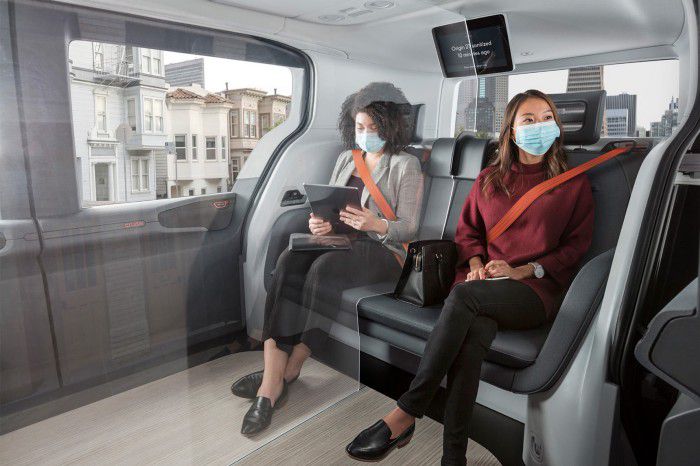Cruise, the self-driving car company owned by General Motors, is doubling down on the Origin, its steering wheel-and-pedal-less autonomous people mover introduced late last year. With the COVID-19 pandemic discouraging many people from using shared ride services, the company unveiled new safety protocols intended to keep people socially distant during trips and the vehicle sanitized between fares.
Cruise is also applying for permission from the federal government to mass-produce the Origin. The vehicle’s lack of traditional human controls means that the company will need an exemption from the federal government’s motor vehicle safety standards, which require vehicles to have a steering wheel and pedals. The National Highway Traffic Safety Administration (NHTSA) only grants 2,500 such exemptions a year. (There is legislation to increase that number to 25,000, but it is currently stalled in the Senate.)
In 2018, GM submitted a petition for permission to deploy a fully driverless Chevy Bolt but never received a final response from NHTSA. That exemption will now be withdrawn in favor of the petition related to the Origin, Cruise says.
The new protocols, as well as the exemption, are also meant to send a message that Cruise is still committed to safely launching a shared robotaxi service in the near future. The coronavirus pandemic has jolted the transportation world, leading to a steep drop in ride-hailing services like Uber and Lyft. Those companies are now trying to mount a comeback based mostly on strict rules requiring masks and cleaning supplies.
:no_upscale()/cdn.vox-cdn.com/uploads/chorus_asset/file/21977450/0_2_bUuvw0FWFNuHLt.jpeg)
:no_upscale()/cdn.vox-cdn.com/uploads/chorus_asset/file/21977449/0__eW1rbtro04Syh9v.jpeg)
Cruise hasn’t launched its ride-hail service yet, nor has it revealed an actual working version of the Origin. But the company wants to get ahead of any speculation that COVID will destroy any demand for shared mobility service in the future.
“COVID-19 changed everything, including the way many people think about shared vehicles,” Robert Grant, VP for global government affairs at Cruise, writes in a blog post. “Sharing anything, it now feels, is a threat to our health.”
Grant says that the Origin’s cabin will be fitted with a plastic partition running down the center. Only two passengers will be allowed in the vehicle at a time, and the company’s venting system will keep the air circulating. Masks will be required, and hand sanitizer and wipes will be made available. The vehicle won’t have a driver, so these protocols will only apply to passengers.
Cruise has a beta ride-hailing service, but it’s only available to employees, and the company won’t say when it will be available to the broader public. Cruise also won’t say when the Origin will roll out, but promises to share more information about its production plans in the future. The vehicle will be manufactured at GM’s Detroit-Hamtramck plant, which was recently renamed Factory Zero.
Cruise is under pressure from its investors, namely Softbank, to launch a commercial taxi service. The company recently received a permit from the California Department of Motor Vehicles to test fully driverless cars, without human safety drivers, in San Francisco.
The company’s safety drivers have been complaining about a lack of safety standards during the pandemic and subsequent wildfires. They accuse Cruise of deploying its self-driving cars during the spring lockdown in defiance of public health orders banning nonessential travel. And they say Cruise isn’t doing enough to keep them safe during these public health crises.
